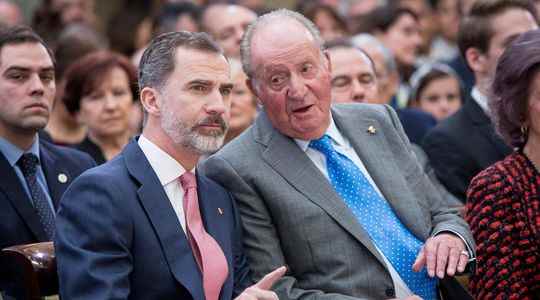Can a deposed king, at the age of 84, endanger the political regime to which he owes his career and his way of life? The exegetes of the Spanish monarchy are asking the question, after the last escapades of Juan Carlos I. Exiled to Abu Dhabi since August 2020, the man who abdicated in June 2014 under the pressure of scandals reappeared in his country last May. No question, for the time being, of announcing his big comeback. He resides in the United Arab Emirates and swears that he will stay there. But when the Spanish courts announced in March the abandonment of the proceedings against him for tax evasion (the former sovereign finally paid more than 4 million euros in unpaid taxes), then in May those for corruption (for lack of evidence and because of his immunity from the time he reigned), Juan Carlos de Bourbon warned that he would now come “regularly” to Spain.
For his first visit, he only stayed four days. Time to attend a regatta in Sanxenxo, Galicia, and to pay a short visit to his family at the Zarzuela Palace. The meeting was said to have been icy. His son, King Felipe VI, had asked him to remain discreet. But his father, long adored for his role in the return of democracy after Franco’s death, did the opposite: he alerted the media to his arrival. His actions were followed step by step by television and celebrity magazines. According to the entourage of Juan Carlos, quoted byEl País, the current head of state would have asked him not to return this summer. “These stagings cannot be repeated,” he would have demanded. We can imagine the painful atmosphere during lunch in the presence of Queen Letizia, the two sisters of the King, Elena and Cristina, and Queen Emeritus Sofia, positive for Covid-19 and conveniently kept at a safe distance from the protagonists.
Juan Carlos the unpopular
Eight years after his coronation, Felipe VI, 54, pursues his goal: to restore the dignity of the monarchy, tainted by the “business” of his father. He is suspected of having pocketed 80 million euros in bribes for helping Spanish construction companies obtain a TGV contract in Saudi Arabia. In addition, the person concerned has never seen fit to justify himself on his extramarital affairs, his elephant hunting parties in Africa or his problems with the tax authorities after his abdication. According to a recent poll, the vast majority of Spaniards (85%) consider that the ex-king is “the main problem” of his heir. Two-thirds of the population believe that Juan Carlos “endangers the future of the Crown” and that his recent visit to the peninsula has been “negative”. According to them, the ex-monarch should have taken the opportunity to finally explain his past, if not to his former subjects, at least to his son.
Questioned by the press after his regatta in Galicia, the person concerned was pithy: “Explanations? What about?” What reinforce his unpopularity in the ranks of the left, in power for four years. In fact, PSOE (Socialist Party) and Podemos (radical left) voters are the most likely to say that Juan Carlos should return to the country as little as possible. On the right, those of the PP (People’s Party) are mostly in favor of his return to Spain, provided he stays away from Felipe. On the far right, Vox voters advocate his return to La Zarzuela. The reigning king is “very well perceived” by his people, assures journalist José Antonio Zarzalejos. But according to this biographer of Felipe VI (Felipe VI. Un rey en la adversidad, Planeta, 2021), the monarchical institution nevertheless remains “to a large extent misunderstood”. An understatement.
The king’s immunity in debate
To remedy this misunderstanding, the socialist head of government Pedro Sanchez is campaigning for the removal of the king’s immunity enshrined in the Constitution. It would be a serious “error”, because “without immunity, there is no monarchy”, reacts however the professor of constitutional law Javier Tajadura. This connoisseur of the subject is worried about the “dangerous polarization” at work in Spain, with “a rise of populist and illiberal forces”. Implied: the far left coalition partner of the Sanchez government and the far right, credited in the spring with 20% of voting intentions in the event of early legislative elections. “The Crown is the symbol not only of the unity of the State, but also of a certain order of values; its opponents are well aware of this”, continues this expert. “What is at stake, beyond the debate between monarchy and republic, is the very meaning of the monarchy of Felipe VI, based on neutrality and exemplarity, and which involves parliamentary democracy, a social economy of market and the full integration of Spain into the European Union and NATO”, he concludes.
If the turpitudes of Juan Carlos led to the fall of the monarchy, it would be the end of Spain, threaten for their part the most fervent royalists, alluding to the secessionist movements of the Basque Country and, above all, of Catalonia. When this region organized an illegal referendum on its independence in October 2017, Felipe VI stepped up to the plate by delivering a solemn address on television. The king had denounced those who want to “break the unity of Spain and national sovereignty” while “all Spaniards have the right to decide democratically on their life in common”. But the Republicans do not budge: the Spaniards should above all be able to choose their head of state. The debate has not finished agitating Spain.
